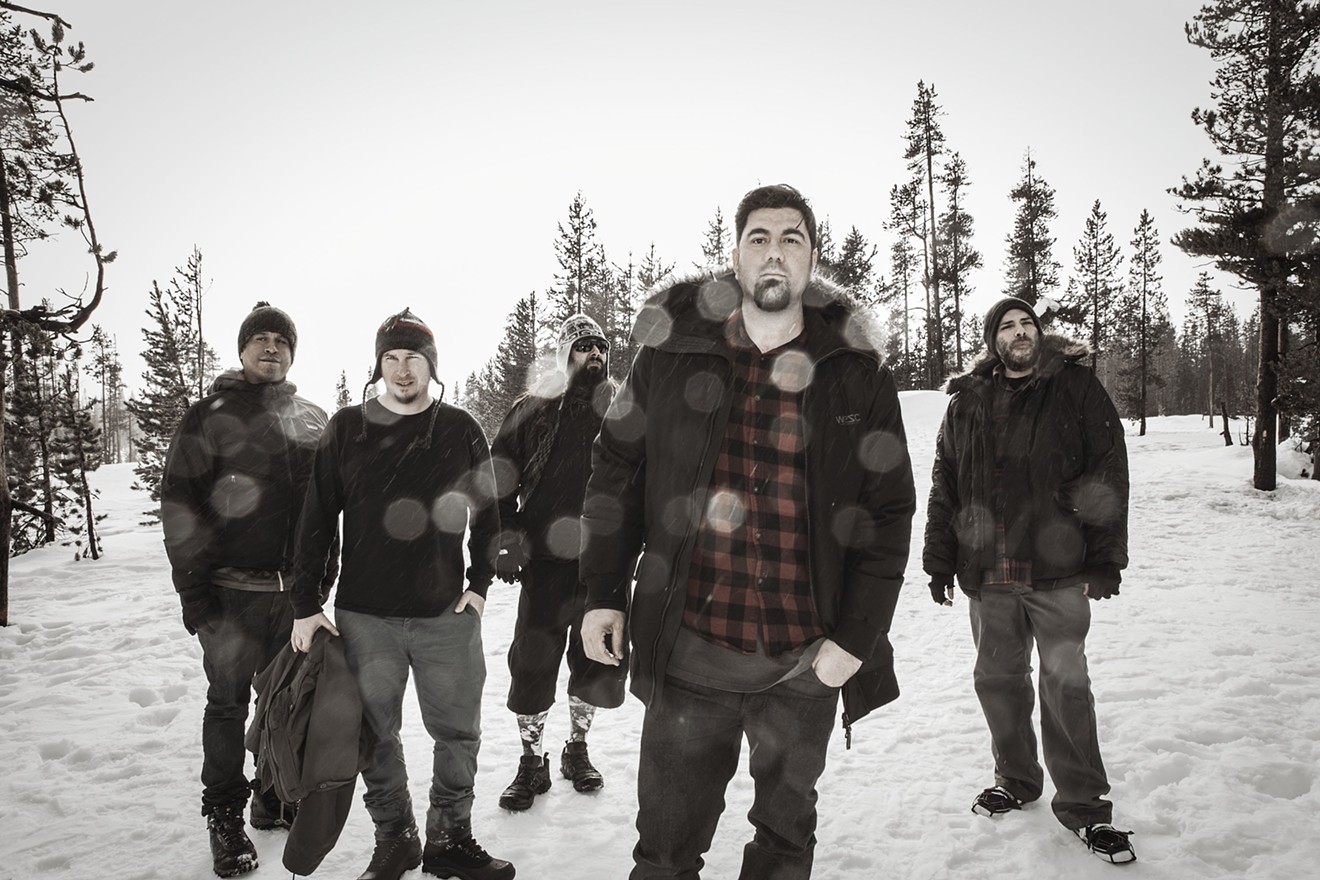Since their formation in the late ’80s, Deftones have been labeled with about a dozen genres — from new metal and shoegaze to alt rock and dark pop. Often, the Sacramento rockers are suggested as pioneers in said genres. But the five-piece tightly stitches together their influences and cultural backgrounds to create a distinct brand of music that’s had critics placing too much significance on where the band fits into the scene and too little on the impressive scope of Deftones’ sturdy, Grammy-winning catalog.
With eight studio albums, an extensive touring schedule, and plenty of accolades, Deftones have sold more than 10 million albums worldwide. While the band certainly fits into the broader experimental metal category, each album weaves together tracks of different tastes. There are anguished screams and heavy riffing on “When Girls Telephone Boys,” and there’s crunchy guitar punk rock on “Around the Fur.” “Change (In the House of Flies)” is heavy, hook-laden, and melodic, while “Sex Tape” delivers sensual watery dream pop. There’s fuzzy, haunting melodic rock on “Tempest,” and clever usage of drum tempo on “Mein.” There’s even a dreamy cover of Lynyrd Skynyd’s “Simple Man” that vocalist/guitarist Chino Moreno recorded in one take as a teenager.
Together, Moreno, guitarist Stephen Carpenter, keyboardist/samplist Frank Delgado, drummer Abe Cunningham, and bassist Sergio Vega craft music that sounds like the soundtrack to a dark adult fairy tale. It connects on a visceral level. With so much turmoil and tragedy in the Deftones’ camp (including creative differences and the death of bassist Chi Cheng in 2013), the band channels those problems into soaring aggression and some of the best build-ups to a musical climax that a fan could ask for. And with the band’s eighth album, 2016’s Gore, hitting No. 2 on the Billboard Top 200 Album chart, critics are finally catching up to what the fans have understood all along: You have to listen to each album with fresh ears and without expectations. This is just Deftones being Deftones.
The band’s final tour date with punk rock co-headliners Rise Against is on Sunday, July 9, at Ak-Chin Pavilion. New Times talked with drummer Cunningham about picking the set list for each tour stop, his musical influences, and still feeling like the band has something to prove. (This conversation has been edited and condensed for clarity.)
New Times: You guys play a lot of eclectic bills, from the Iceland Secret Solstice [where vocalist Moreno was invited to do an intimate performance in a volcano] to the current tour with punkers Rise Against, and to some people, appeal to a range of genre fans. How do you curate the set list depending on where the band is playing?
Abe Cunningham: I would like to say we don’t worry about it, but we do. It’s kind of cool because if we’re in a town we haven’t been at in a while, we’ll ask our manager to pull up the set list from the last time we were in that town so we don’t have repeat offending songs. We have quite a bit of material over the years that we’re able to pick and choose and make a nice balance. But we want it to be fun for us, too. There’s also things you have to play that people will be pissed if you don’t! Also this tour, each band is playing only an hour and five minutes. So it’s pretty quick.
I learned a long time ago that you can’t please everyone, but you can certainly try. Plus, our fans like us for a range of reasons. One fan might love us for heavy songs, whereas another wants the shoegaze-y melodics.
Gore was a very-well-received album. Over the years, critics have stated that Deftones in particular are great at creating albums that provide a snapshot of where the band is at right now.
That’s very true. Whenever we start writing records, we go in and don’t really have a plan for better or worse, but that’s always been the way we operate. Really, it’s about enjoying the time and each other. If we’re smiling, that’s three-quarters of the battle right there. It’s not always easy to get everyone on the same page, especially since we’ve been doing this for so long. These days, things are pretty good and we’re all super-grateful that we’re still able to do this.
Are you guys working on a new album for 2018?
We’re more or less messing around right now. We’re not one of those bands that usually writes new material on the road. It’s pretty much that we’re in that life and that moment, touring and performing. But at jams and soundchecks we’ll stumble across things that we think are cool ideas and will put them in our back pocket. But that’s more lowkey and not official writing time.
What’s your proudest moment on Gore — for you specifically, or the band as a whole?
There’s a song called “Hearts/Wires” on there, and it’s funny, because Stephen [Carpenter, guitarist] hated the song so much! Everybody kept on dropping it and playing it to keep it alive. But he hated it. He was such a jerk and would say the meanest things. Then lo and behold, it stuck and made it on the record and now it’s his favorite song. And then, just completing the record, too. We’re all in a good headspace these days. There’s been a lot of times we weren’t, and that’s just part of living in a band with five minds and opinions. So getting Gore done was truly the high point.
I think we’re ready to get down and do some new music for 2018, hopefully.
Speaking of being in a different headspace, when the band started when you guys were practically just kids. Now many of the members have kids.
I do — but I’m an old kid! We’re just old kids now.
What were some of your biggest drumming inspirations growing up — or still to this day?
Well, both my parents were musicians while I was growing up. So I grew up around music, that culture, and musicians. Plus my mom was a chef, too, so I grew up in kitchens where music was always playing. I listened to everything they were into, which was a wide mix of genres. As far as drumming goes, Stewart Copeland from The Police is one of my all-time favorites. And I do my damndest to mimic his thing without, you know, just taking it and stealing it. But you know, that’s what it’s all about: taking something that influences you and making it your own. Your ears and your heart and make it your own.
So how does being a father reflect in how you perceive music nowadays, not just your own but other bands as well?
I think the touring aspect comes into that mostly. That’s the largest chunk of what we do. When we just started out, and I mean, even nowadays and the last 10 years, it’s all we did. We toured relentlessly. We knew we had something to prove — and honestly, I think we still feel that way a bit.
But we used to just go go go go go. With having families and everything that comes with that, over the years, we finally just reached a balancing point and realized that we need to address that battle, too. It’s a quest figuring out being normal people at home and chill, and then out rocking it on tour to earn a living. But part of the battle is all of us figuring that out with each other, and on our own. It took a long time to get there.
Deftones and Rise Against perform at 7 p.m. Sunday, July 9, at Ak-Chin Pavilion. Tickets are $22 and up through Livenation.
[
{
"name": "Air - MediumRectangle - Inline Content - Mobile Display Size",
"component": "18478561",
"insertPoint": "2",
"requiredCountToDisplay": "2"
},{
"name": "Editor Picks",
"component": "16759093",
"insertPoint": "4",
"requiredCountToDisplay": "1"
},{
"name": "Inline Links",
"component": "17980324",
"insertPoint": "8th",
"startingPoint": 8,
"requiredCountToDisplay": "7",
"maxInsertions": 25
},{
"name": "Air - MediumRectangle - Combo - Inline Content",
"component": "16759092",
"insertPoint": "8th",
"startingPoint": 8,
"requiredCountToDisplay": "7",
"maxInsertions": 25
},{
"name": "Inline Links",
"component": "17980324",
"insertPoint": "8th",
"startingPoint": 12,
"requiredCountToDisplay": "11",
"maxInsertions": 24
},{
"name": "Air - Leaderboard Tower - Combo - Inline Content",
"component": "16759094",
"insertPoint": "8th",
"startingPoint": 12,
"requiredCountToDisplay": "11",
"maxInsertions": 24
}
]












